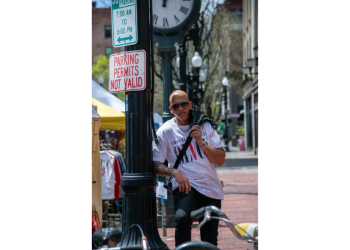The conference traditionally has not allowed cameras or live broadcast from federal courtrooms. That changed during the pandemic, when judges were permitted to set up remote audio access for any civil or bankruptcy proceeding because of the restricted access to courthouses.
The new policy, which takes effect Sept. 22, will allow judges to provide access only to non-trial proceedings in civil or bankruptcy cases that do not involve witness testimony. The conference is reviewing whether such access increases the potential for witness intimidation or complicates sequestration when proceedings are available to people not present in the courtroom.
Tuesday’s announcement came after the biennial meeting of the conference, which is made up of 26 federal judges and led by Chief Justice John G. Roberts Jr. In response to questions from reporters, the chairman of the body’s executive committee, Judge Lavenski R. Smith, said participants did not discuss a request from Democrats that the conference investigate omissions in past financial disclosure reports filed by Justice Clarence Thomas.
In April, Sen. Sheldon Whitehouse (D-R.I.) and Rep. Hank Johnson (D-Ga.) asked the conference to look into Thomas’s failure to disclose travel and real estate deals with longtime friend and benefactor Harlan Crow. In Thomas’s most recent annual report, made public last month, the justice detailed private jet travel with the Dallas billionaire businessman and updated his filings to include a property sale years ago to Crow.
Smith told reporters there was no update Tuesday on the status of the lawmakers’ request. The conference could eventually review any action taken by a judicial conference committee investigating the allegations involving Thomas.
Smith said some lawmakers who addressed the conference Tuesday generally raised the issue of Supreme Court ethics. Congressional Democrats have backed legislation to impose an ethics policy on the nine justices. Senate Judiciary Chairman Richard J. Durbin (D-Ill.), seated next to Roberts during the closed-door session with lawmakers, used his remarks to urge the chief justice to establish an enforceable code of conduct, according to a person familiar with the remarks who spoke on the condition of anonymity to discuss the private gathering.
Durbin told the judges that it saddens him that the high court is facing an ethical crisis, this person said, adding that Durbin described the crisis as being of the court’s own making, in part because of the lack of an enforceable policy.
While cameras are common in some state and local courts, federal rules generally prohibit photography and the broadcasting of federal criminal cases. The Supreme Court began live-streaming audio of oral arguments when the court was closed to the public during the pandemic. The popular practice continued when the justices resumed in-person arguments last fall. During the pandemic, some criminal proceedings were held by videoconference, but federal courts have mostly discontinued that practice.
Press organizations and transparency advocates had urged the conference in a letter last month to allow trial courts to permit remote audio access to all civil and bankruptcy proceedings, including those with witness testimony. As an example, the groups pointed to a civil trial made available to the public via Zoom last February over lead contamination of drinking water in Flint, Mich. Similarly, the criminal trial of Derek Chauvin, the former police officer convicted of murdering George Floyd, was broadcast from a Minnesota state courtroom.
Gabe Roth of the court transparency group Fix the Court called the updated policy a step backward.
Advocates “realize we’re probably not going to get live video of most federal trials in the near future. But limiting audio access to proceedings without witnesses? That’s a step backwards, especially since it’s not hard to turn off recording devices or disguise a voice if, say, a witness is a minor or crime victim,” Roth said.
In a separate letter, about three dozen House Democrats asked court leaders to go further and allow public video access to Trump’s trials on federal charges related to the 2020 election and the retention of classified documents at his Mar-a-Lago residence and resort.
“It is imperative the Conference ensures timely access to accurate and reliable information surrounding these cases and all of their proceedings, given the extraordinary national importance to our democratic institutions and the need for transparency,” said to the letter, led by Rep. Adam B. Schiff (Calif.). “Given the historic nature of the charges brought forth in these cases, it is hard to imagine a more powerful circumstance for televised proceedings.”
Trump’s legal team has said it would welcome the additional transparency.
Judge Roslynn Mauskopf, director of the Administrative Office of the U.S. Courts and the conference secretary, said in response that the letter would be reviewed by the committee that considers proposed changes to rules that currently prohibit broadcasting of criminal proceedings.
Johnson, one of several members of Congress who addressed the gathering Tuesday, said the Judicial Conference should be responsive to the public. He noted that the judge overseeing the election interference case against Trump in Georgia state court has said it will be televised live and streamed online.
“The people want to see and hear what’s going on in the federal prosecution” of the former president, Johnson said.
John Wagner contributed to this report
























